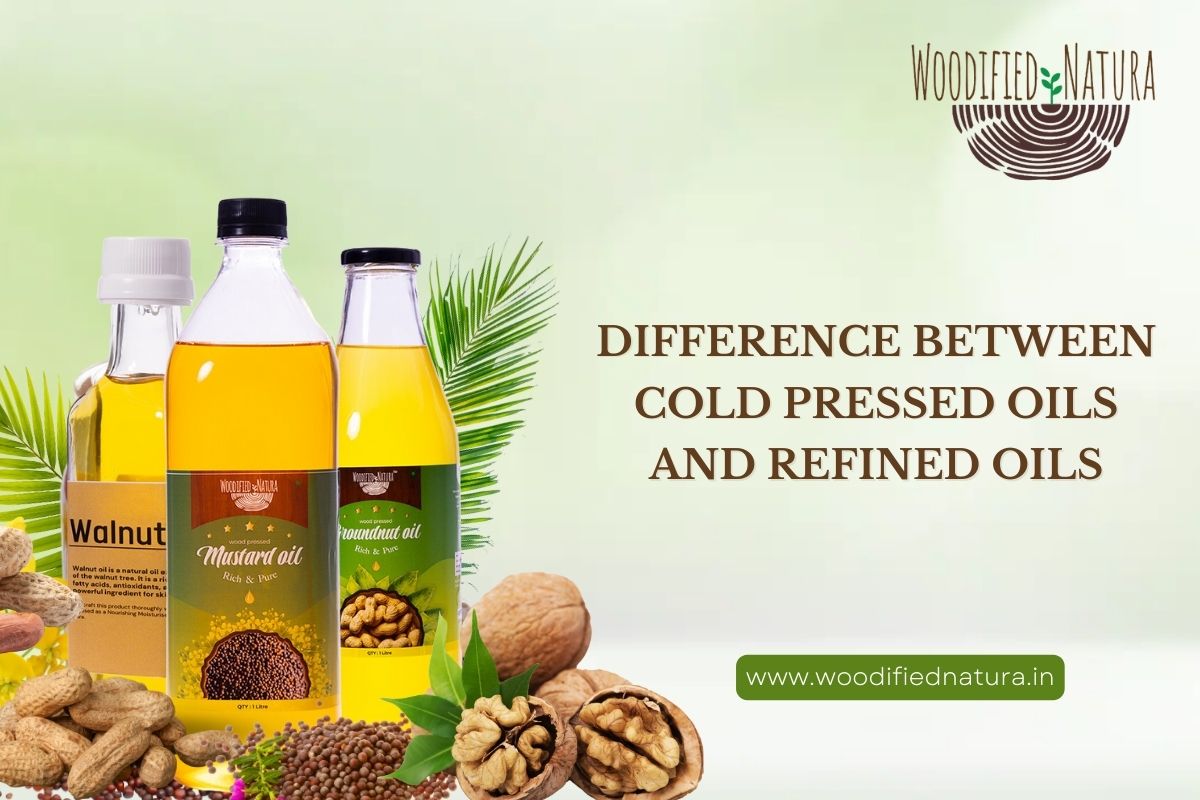Oils are an essential part of our daily diet and cooking routines. When it comes to choosing oils, there are various options available, including cold pressed oils and refined oils. With the world becoming more health conscious, consumers are looking for healthier options and are anxious to know more. This industry is getting more competitive as a result, many oil brands have taken birth. One amongst these is Woodified Natura’s Wood Pressed Oil, which differs uniquely from the other brands with its natural processing techniques. These two types of oils differ in their extraction methods and processing techniques, which results in differences in taste, nutritional composition, and overall quality. In this article, we will explore the differences between cold-pressed oils and refined oils to help you make informed choices about the oils you use in your kitchen.
Understanding Cold-Pressed Oils
Cold-pressed oils are extracted from various sources, such as seeds, nuts, or fruits, using a mechanical pressing method. The process involves crushing the raw material and then pressing it to extract the oil without applying excessive heat or chemicals. Cold pressing preserves the natural flavors, aromas, and nutritional qualities of the oil.
Refined oils undergo a more extensive processing method compared to cold-pressed oils. The refining process involves multiple stages, including extraction, refining, bleaching, and deodorizing. These processes remove impurities, colors, and odors from the oil, resulting in a clear and neutral-tasting product. Refined oils often have a longer shelf life and a higher smoke point compared to cold-pressed oils.
Extraction and Processing Methods
The key difference between cold-pressed oils and refined oils lies in their extraction and processing methods. Cold-pressed oils are extracted through mechanical pressing, which involves crushing the raw material and applying pressure to extract the oil. This method retains the natural nutrients, flavors, and aromas of the oil. On the other hand, refined oils go through a series of refining processes that involve heat, chemicals, and filtration to remove impurities, resulting in a more processed and purified oil.
Nutritional Composition
Cold-pressed oils are often considered more nutritious compared to refined oils. The gentle extraction method of cold pressing helps retain the natural antioxidants, vitamins, minerals, and fatty acids present in the raw material. Refined oils, due to their extensive processing, may have lower levels of these beneficial components. However, it’s important to note that the nutritional composition can vary depending on the specific oil and the refining process used.
Flavor and Aroma
Cold-pressed oils are known for their distinct flavors and aromas, which vary depending on the source material. These oils retain the natural essence of the raw material, providing a more pronounced taste and aroma. Refined oils, on the other hand, have a milder and more neutral flavor profile, as the refining process removes much of the characteristic flavors and aromas.
Smoke Point and Cooking Applications
The smoke point of an oil refers to the temperature at which it starts to smoke and produce harmful compounds. Cold-pressed oils generally have lower smoke points compared to refined oils. This means that refined oils are more suitable for high-heat cooking methods such as frying and deep-frying, as they can withstand higher temperatures without smoking. Cold-pressed oils are better suited for low to medium-heat cooking methods, such as sautéing or drizzling over salads.
Shelf Life and Storage
Refined oils typically have a longer shelf life compared to cold-pressed oils due to the refining process, which removes impurities that can contribute to spoilage. The removal of impurities also makes refined oils more resistant to oxidation. Cold-pressed oils, on the other hand, may have a shorter shelf life and are generally recommended to be stored in a cool and dark place to maintain their quality and freshness.
The choice between cold-pressed oils and refined oils depends on personal preferences, cooking applications, and nutritional considerations. Cold-pressed oils offer a more natural and nutrient-rich option, with distinct flavors and aromas. Refined oils, on the other hand, provide a neutral-tasting oil with a longer shelf life and higher smoke point. Check out https://woodifiednatura.in It’s important to consider the specific oil and its quality, as well as the intended use when making a decision.
Frequently Asked Questions (FAQs)
Are cold-pressed oils healthier than refined oils?
Cold-pressed oils are often considered healthier due to their higher nutrient content and lack of chemical processing. However, the overall healthiness depends on the specific oil and individual dietary needs.
Can refined oils be used for salad dressings or other raw applications?
Refined oils can be used for salad dressings or other raw applications, but they may lack the distinct flavors and nutritional benefits of cold-pressed oils. It’s a matter of personal preference and desired taste.
Do cold-pressed oils cost more than refined oils?
Cold-pressed oils are generally more expensive than refined oils due to the differences in extraction methods and processing. The cost may vary depending on the specific oil and its source.
Can refined oils be used for high-heat cooking?
Yes, refined oils are suitable for high-heat cooking methods as they have higher smoke points and can withstand higher temperatures without smoking or burning.
Are there any specific health benefits associated with cold-pressed oils?
Cold-pressed oils can contain higher levels of antioxidants, vitamins, and minerals, which may offer certain health benefits. However, the extent of these benefits can vary depending on the specific oil and individual dietary factors.








